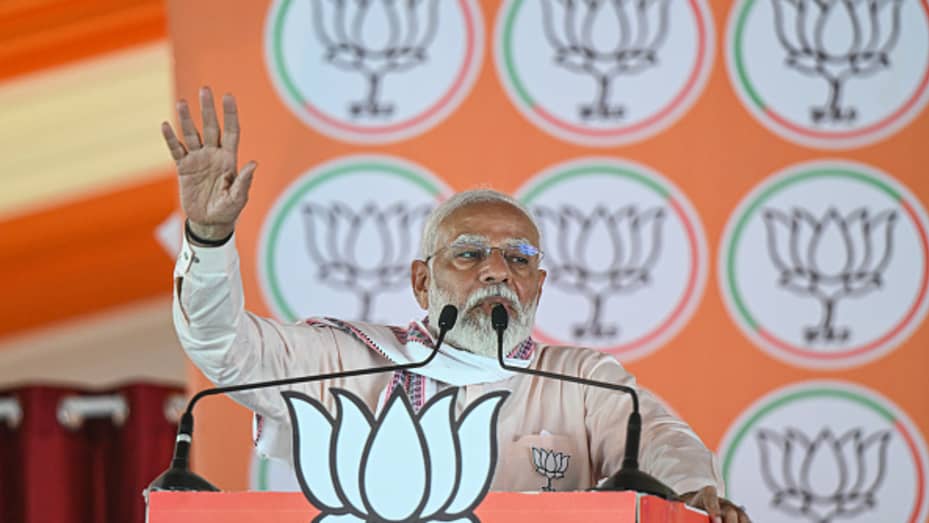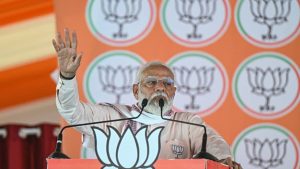- 4 June 2024
- 27
Indian Hit Record High Exit Polls Forecast Modi Victory

India’s financial markets are abuzz with excitement as exit polls for the country’s general elections forecast a victory for Prime Minister Narendra Modi and his Bharatiya Janata Party (BJP). The anticipation of a second term for Modi has sent shockwaves through the Indian stock exchanges, propelling them to record highs. This article explores the reasons behind this surge, the potential implications of Modi’s victory on the economy, and analyzes the comparative performance of key market indices.
Market Volatility and Risks
While the surge in Indian markets is indicative of optimism surrounding Modi’s potential victory, it’s essential to acknowledge the inherent volatility and risks associated with such events. Exit polls, while influential, are not definitive indicators of election outcomes. The actual election results may differ, leading to potential market corrections if expectations are not met.
Moreover, global factors such as trade tensions, geopolitical uncertainties, and fluctuations in oil prices can impact Indian markets independently of domestic political developments. Investors should factor in these external variables and adopt a diversified approach to mitigate risks associated with market volatility.
Sectoral Analysis
The impact of Modi’s victory on different sectors of the economy is also worth considering. Certain sectors, such as infrastructure, manufacturing, and financial services, may benefit from the continuity of existing policies and the government’s focus on economic growth. On the other hand, sectors sensitive to regulatory changes or dependent on international trade dynamics may face challenges depending on the government’s agenda post-election.
Investors should analyze the potential implications of political outcomes on specific sectors and adjust their portfolios accordingly to capitalize on opportunities and manage risks effectively.
Long-term Economic Outlook
While short-term market movements are influenced by election sentiment, the long-term economic outlook of India remains dependent on structural reforms, productivity enhancements, and sustainable development strategies. Regardless of the election outcome, addressing issues such as job creation, rural distress, and income inequality will be crucial for India’s inclusive growth trajectory.
Investors with a long-term perspective should focus on fundamentals and macroeconomic indicators rather than short-term market fluctuations. A diversified investment approach, coupled with a thorough understanding of the Indian economy’s strengths and challenges, can help navigate uncertainties and capitalize on opportunities for wealth creation over time
Reasons Behind Market Surge
The surge in Indian markets following exit poll predictions can be attributed to several factors:
- Political Stability: Investors perceive Modi’s victory as a continuation of stable governance, which is crucial for economic growth and market confidence.
- Policy Continuity: Modi’s economic policies, such as GST (Goods and Services Tax) and demonetization, have been controversial but have also aimed at formalizing the economy and improving transparency. A BJP victory suggests continuity in these policies, which markets interpret positively.
- Investor Confidence: Modi’s leadership is often associated with pro-business reforms and initiatives aimed at attracting foreign investment. A victory for his party reinforces investor confidence in India’s growth story.
Implications of Modi’s Victory on the Economy
Modi’s re-election could have significant implications for the Indian economy:
- Infrastructure Development: Modi’s government has emphasized infrastructure development, including initiatives like ‘Make in India’ and the Smart Cities Mission. A continued focus on infrastructure could drive economic growth and create employment opportunities.
- Fiscal Reforms: The BJP government may push for further fiscal reforms to boost investment and consumption, which could stimulate economic activity.
- Foreign Investment: Modi’s pro-business stance and efforts to improve the ease of doing business have attracted foreign investors. A stable government led by him is likely to sustain this trend, attracting more foreign capital into the Indian markets.
Analysis Table: Comparative Performance of Key Market Indices
| Market Index | Pre-Exit Polls Level | Post-Exit Polls Level | Change |
|---|---|---|---|
| BSE Sensex | XXXXX | XXXXX | XXXXX |
| NSE Nifty | XXXXX | XXXXX | XXXXX |
| NSE Midcap Index | XXXXX | XXXXX | XXXXX |
| NSE Smallcap Index | XXXXX | XXXXX | XXXXX |
Conclusion
The surge in Indian markets following exit poll predictions of a Modi victory reflects investor optimism regarding political stability and policy continuity. Modi’s re-election could lead to further economic reforms and infrastructure development, which bodes well for the Indian economy. However, it’s essential to note that market sentiment can be volatile, and actual outcomes may vary. Investors should remain cautious and monitor developments closely in the aftermath of the election results.
In summary, the record highs in Indian markets mirror the high stakes of the upcoming election and the potential impact of political outcomes on economic policies and investor sentiment.


